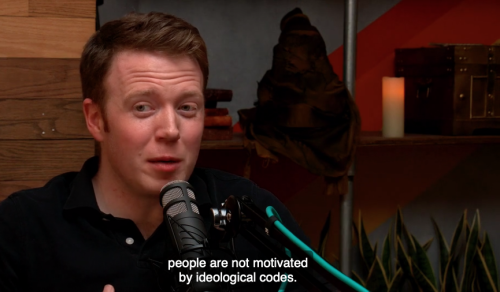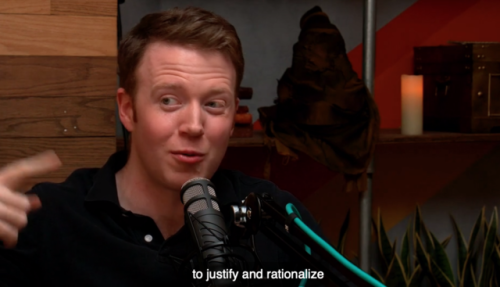Thecaffiend - Thecaffiend
More Posts from Thecaffiend and Others
do u ever realise that you’re gonna be an adult for the rest of your life

c a s u a l
a hard pill to swallow: if an audience can pick up on where the story is going, it’s a good story.
Quantum Mechanics Itself as Emergent 'Phenomenon'?

Recently, we've been talking about emergence - more explicitly about emergent phenomena in many body systems. But what if the concept of emergence would not only apply 'within' quantum mechanics but also 'outside' the theory? What if quantum mechanics itself is an emergent theory from a classical-type underlying 'reality'? This is exactly the approach of an interpretation of quantum mechanics, called emergent quantum mechanics (EmQM).
Where is EmQM located in the 'zoo' of interpretations?
The 'zoo' of interpretations and alternative theories of quantum mechanics can be classified by their answers to the violation of Bell's inequalities. Bell's Theorem is a theory-independent result and therefore must hold for any possible approach which reproduces the results of standard quantum mechanics. Roughly speaking, the theorem's consequences are that one either has to give up the traditional understanding of realism, or the idea of locality. E.g. Rovelli's approach and QBism belong to the camp which gives up traditional realism and adheres to locality, whereas Bohmian Mechanics sticks to realism and therefore embraces nonlocality. In general, hidden variable theories belong to this 'realist' camp.
EmQM suspects a locally deterministic theory from which standard quantum mechanics emerges. Walleczek and Groessing (p. 2, [1]) suppose that instead of "absolute quantum randomness" there might be "quantum interconnectedness" - indicating the presence of some kind of nonlocality, e.g. nonlocal causality. Hence, this approach seems to belong to the above called 'realist' camp, in which a traditional understanding of realism is embraced and the price to pay is nonlocality, more neatly called "quantum interconnectedness".
Why EmQM?
Walleczek and Groessing [1] argue that a metaphysical fundament is needed in order to unify general relativity and quantum mechanics. Since general relativity is strictly deterministic and standard quantum mechanics inherently indeterministic, the metaphysical fundament of each theory starkly opposes each other such that the lack of unification seems inevitable. However, setting a microscopically causal fundament for both branches of physics, as well as the focus onto emergent phenomena, might yield a solution. For instance, the theory of quantum gravity already relies on the idea of emergent spacetime - together with EmQM it may be possible to lay a metaphysical framework of 'all physics'. Nevertheless it might be questionable, in my view, how this is supposed to work with an approach as EmQM in which nonlocality is a cornerstone, i.e. possibly causing trouble with causality as we know it from relativity.
EmQM and Bohmian Mechanics
Since EmQm and Bohmian Mechanics (BM) belong to the same, 'realist' camp, both seem to be related. Both claim to describe the underlying 'reality' beneath standard quantum mechanics. Both approaches share the belief that standard textbook quantum mechanics does not have descriptive character regarding the nature of reality, even though the theory is empirically successful. Then, standard quantum mechanics is regarded as an 'effective' theory.
However, two approaches can be well compared by regarding how they attempt to reproduce standard quantum mechanics. One main aspect in this respect is the appearance of randomness. Both approaches claim to be fundamentally deterministic and therefore have to explain why we experience the randomness of standard quantum mechanics in our laboratories. Bohmians do this by introducing so called "absolute uncertainty" [3], which is a consequence of the quantum equilibrium hypothesis. Effectively, this means that a universe in which Bohmian Mechanics governs the dynamics, it is impossible to gain knowledge about the configuration of a system beyond the probability distribution determined by the wave function ρ=|ψ|^2. Hence, the complete configuration of point particles, their positions and velocities do exist, but there is no experimental access to it. This limited knowledge is supposed to be the source of randomness and uncertainty that we encounter in standard quantum mechanics:
"This absolute uncertainty is in precise agreement with Heisenberg's uncertainty principle. But while Heisenberg used uncertainty to argue for the meaninglessness of particle trajectories, we find that, with Bohmian mechanics, absolute uncertainty arises as a necessity, emerging as a remarkably clean and simple consequence of the existence of trajectories." (p.864 [3])
Instead of making use of a (more or less ad-hoc) hypothesis, the appearance of randomness in EmQM seems a bit more natural: Only because the underlying dynamics is supposed to be deterministic, this does not imply pre-determination. This is something one can already observe in purely classical systems: The more complex a system is, the more uncertain is the outcome (often referred as "deterministic chaos"). A minor change in the boundary conditions can cause a huge change in the result. Thus, the central point is emergence:
"Critical in this context is that emergent phenomena are subject to unpredictability as a consequence of the intrinsically self-referential nature of the governing dynamics [...]." (p.5 [1])

In comparison, BM formulates its theory in a rather rigid manner. It formulates postulates from which the theory can be deduced. The issue with this is that these postulates have kind of an ad-hoc character. In my view, EmQM circumvents these problems by being less strict/definite. This approach does not seem to have a fixed formalism yet (at least I haven't found analyses on the same level of rigor as there are for BM), while the research seems to be more focused on exploring how emergence can enter the picture - as e.g. 't Hooft does in [2], where he describes explicit examples of possibly emergent symmetries. (Disclaimer: maybe my impression is incorrect, since I have only superficial knowledge about EmQM.)
Regardless of this point, both approaches seem to be interconnected in the end. Walleczek and Groessing (p.2 [1]) claim that a future EmQM would include BM. Hence, in my view, it might be possible that EmQM might support BM in the sense that it lifts the necessity of possibly ad-hoc appearing postulates as formulated in BM. Thus, any theory of quantum mechanics (orthodox or unorthodox) might not only yield emergent phenomena within the theory but quantum mechanics might unravel itsel as an emergent 'phenomenon'.
---
References:
[1] Walleczek, Groessing, Is the World Local or Nonlocal? Towards an Emergent Quantum Mechanics in the 21st Century, arXiv:1603.02862, 2016
[2] 't Hooft, Emergent Quantum Mechanics and Emergent Symmetries, arXiv:0707.4568, 2007
[3] Dürr, Goldstein, Zanghí, Quantum equilibrium and the origin of absolute uncertainty. J Stat Phys 67, 843–907 (1992). https://doi.org/10.1007/BF01049004





Strange Places series by Artem Chebokha
This artist on Instagram

I realized why the idea of constellations has always swayed me. constellations are so very human.
our wonder of the stars is bone-sunk; we’ve been thinking and dreaming and watching and watching and watching since the beginning of time, and we looked for so long that we started making connections.
we played a celestial game of connect-the-dots; trying to find order in something so vast and trying to show that the stars are in everything and everything is in the stars.
we plucked pictures out of the infinite; there’s a dog, there’s a bear, there’s a lion, see? look, right there; the stars hold and mirror back everything.
but then it went a step further. instead of everyday things, we stopped picking out the cups and the bears, and instead we saw stories.
look, there’s Andromeda, chained to a rock and waiting to be devoured by Cetus. there’s Orion, and Hercules, and do you see Orpheus’ lyre? Zeus sent an eagle to retrieve it after Orpheus’ death and he placed it in the sky.
we did the most human thing imaginable: we wrote our stories into the stars. we filled the night sky; previously so vast, so unknowable; with our history. we forged connections to the stars and made it so our children will always know where they come from.
Your purpose in life is not to love yourself but to love being yourself.
If you goal is to love yourself, then your focus is directed inward toward yourself, and you end up constantly watching yourself from the outside, disconnected, trying to summon the “correct” feelings towards yourself or fashion yourself into something you can approve of.
If your goal is to love being yourself, then your focus is directed outward towards life, on living and making decisions based on what brings you pleasure and fulfillment.
Be the subject, not the object. It doesn’t matter what you think of yourself. You are experiencing life. Life is not experiencing you.
My tiny mind blown
-
 loptoustome reblogged this · 1 week ago
loptoustome reblogged this · 1 week ago -
 heardbook reblogged this · 1 week ago
heardbook reblogged this · 1 week ago -
 elieslittlecreations liked this · 1 week ago
elieslittlecreations liked this · 1 week ago -
 skykaykay reblogged this · 1 week ago
skykaykay reblogged this · 1 week ago -
 msbellebelle reblogged this · 1 week ago
msbellebelle reblogged this · 1 week ago -
 bored-procastinator reblogged this · 1 week ago
bored-procastinator reblogged this · 1 week ago -
 miss-tomoe liked this · 1 week ago
miss-tomoe liked this · 1 week ago -
 fiachdubh reblogged this · 1 week ago
fiachdubh reblogged this · 1 week ago -
 anotherwordforrecluse liked this · 1 week ago
anotherwordforrecluse liked this · 1 week ago -
 skypig357 liked this · 1 week ago
skypig357 liked this · 1 week ago -
 straydogsco reblogged this · 1 week ago
straydogsco reblogged this · 1 week ago -
 nerdylibertarian928 liked this · 1 week ago
nerdylibertarian928 liked this · 1 week ago -
 t0mies-b0dy reblogged this · 1 week ago
t0mies-b0dy reblogged this · 1 week ago -
 meticuloushavoc reblogged this · 1 week ago
meticuloushavoc reblogged this · 1 week ago -
 mycobimbology reblogged this · 1 week ago
mycobimbology reblogged this · 1 week ago -
 mycobimbology liked this · 1 week ago
mycobimbology liked this · 1 week ago -
 dankest-of-lies liked this · 1 week ago
dankest-of-lies liked this · 1 week ago -
 one-girly-geek reblogged this · 1 week ago
one-girly-geek reblogged this · 1 week ago -
 lordotong liked this · 1 week ago
lordotong liked this · 1 week ago -
 thesilverhunt3r reblogged this · 1 week ago
thesilverhunt3r reblogged this · 1 week ago -
 channelsurfer02 liked this · 1 week ago
channelsurfer02 liked this · 1 week ago -
 channelsurfer02 reblogged this · 1 week ago
channelsurfer02 reblogged this · 1 week ago -
 stupid-fat-panda reblogged this · 1 week ago
stupid-fat-panda reblogged this · 1 week ago -
 nutzgunray-lvt liked this · 1 week ago
nutzgunray-lvt liked this · 1 week ago -
 pastelstoic liked this · 1 week ago
pastelstoic liked this · 1 week ago -
 sparksnyper reblogged this · 1 week ago
sparksnyper reblogged this · 1 week ago -
 askmarietheapprentice reblogged this · 1 week ago
askmarietheapprentice reblogged this · 1 week ago -
 giganotus liked this · 1 week ago
giganotus liked this · 1 week ago -
 nightbringer24 liked this · 1 week ago
nightbringer24 liked this · 1 week ago -
 takashi0 reblogged this · 1 week ago
takashi0 reblogged this · 1 week ago -
 magodangretsus reblogged this · 1 week ago
magodangretsus reblogged this · 1 week ago -
 nightwingisnotperfect liked this · 1 week ago
nightwingisnotperfect liked this · 1 week ago -
 peachyyokai liked this · 1 week ago
peachyyokai liked this · 1 week ago -
 fahrennheit liked this · 1 week ago
fahrennheit liked this · 1 week ago -
 liontheliam reblogged this · 1 week ago
liontheliam reblogged this · 1 week ago -
 ascen-dance liked this · 1 week ago
ascen-dance liked this · 1 week ago -
 aubreyplzbemydaddy liked this · 1 week ago
aubreyplzbemydaddy liked this · 1 week ago -
 kermittingacrime reblogged this · 1 week ago
kermittingacrime reblogged this · 1 week ago -
 kelly-clickspring liked this · 1 week ago
kelly-clickspring liked this · 1 week ago -
 eldritchforesthorror liked this · 1 week ago
eldritchforesthorror liked this · 1 week ago -
 g0respunkz liked this · 1 week ago
g0respunkz liked this · 1 week ago -
 therealbrigeedarocks reblogged this · 1 week ago
therealbrigeedarocks reblogged this · 1 week ago -
 perverted-pizza liked this · 1 week ago
perverted-pizza liked this · 1 week ago -
 blueberry2cheesecake liked this · 1 week ago
blueberry2cheesecake liked this · 1 week ago -
 somedudewithopinions liked this · 1 week ago
somedudewithopinions liked this · 1 week ago -
 thisbloghasnoactualpurpose reblogged this · 1 week ago
thisbloghasnoactualpurpose reblogged this · 1 week ago -
 lsandump reblogged this · 1 week ago
lsandump reblogged this · 1 week ago -
 liimlsan reblogged this · 1 week ago
liimlsan reblogged this · 1 week ago -
 snowflake4275 reblogged this · 1 week ago
snowflake4275 reblogged this · 1 week ago -
 eggtithing reblogged this · 1 week ago
eggtithing reblogged this · 1 week ago









